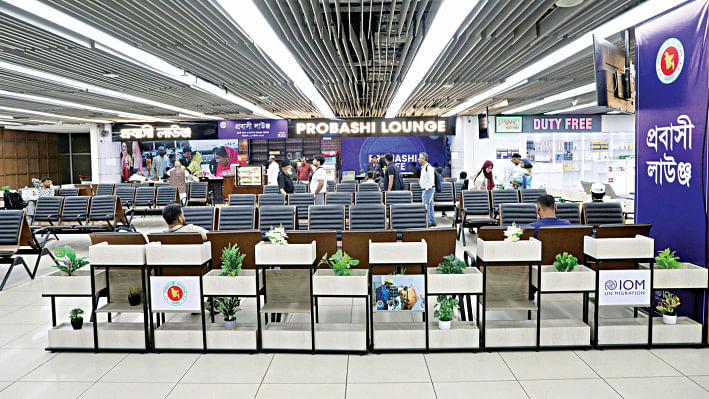Staff Correspondent
Published:2025-09-23 08:35:05 BdST
Hundi squeeze fuels surge in remittances—for how long?
In the latest financial year, Bangladesh received almost $6.5 billion more in remittances than in the previous year.
Experts attribute this surge to the near-paralysis of the hundi, or informal money transfer, network for capital flight after the political transition at home.
But how long will such growth last? And for how long will the hundi network remain subdued? Those are the questions now in focus.
Experts say the answer depends on the new government. Unless it demonstrates the capacity to curb money laundering via hundi, upskill migrant workers and tackle corruption, this growth will not be sustained.
Their advice on building capacity: keep reforms going and enforce policies strictly.
Zahid Hussain, former lead economist at the World Bank’s Dhaka office, believes remittance growth “may not slow much” if the current momentum in manpower exports continues.
According to him, since the fall of the Awami League–led government, money launderers’ “hundi network isn’t functioning”. With a stronger dollar rate, migrants are “more encouraged” to send funds through banking channels.
The Ministry of Expatriates’ Welfare and Overseas Employment tracks remittance by calendar year, while Bangladesh Bank reports by financial year.
Per central bank data, in FY2024-25 expatriates sent a record over $30 billion in remittances, up 26.80 percent year-on-year. In FY2023-24 they sent $23.91 billion.
Previously, the highest remittance came during COVID: $24.77 billion in FY2020–21.
As post-pandemic recovery gathered pace, imports rose and pressure on foreign exchange intensified.
There were also allegations of money laundering disguised as imports.
Masud Biswas, former chief of the Bangladesh Financial Intelligence Unit (BFIU), said at a press conference that in some cases import prices were inflated by “up to 200 percent” to launder funds.
Even so, Zahid Hussain argues that FY2024-25 and FY2020-21 had different backdrops for remittances.
He said, “During the pandemic no one went out. To save lives, the hundi network effectively shut down. The sender couldn’t move, and the facilitator stayed home too. So the network didn’t function. Banks were the only lifeline.
“Now it’s different. Those who laundered money are either in hiding in the country, in jail, or slipped quietly abroad.”
Asked where remittances might land by the end of the current financial year, he said: “The first question is whether $30 billion will come. Ordinarily that wouldn’t have happened. This time it did for different reasons.
“There is no politically backed money-laundering clique. So you can say the hundi network is closed. Bangladesh Bank also has had some role here.”
The interim government has said the parliamentary election will be held in February, and the Election Commission is preparing on that timeline.
Some fear the hundi network could resurface after the polls.
Urging stronger institutional capacity for the financial intelligence agency, economist Zahid said: “Reforms must continue. Policy enforcement has to be strict. The government should start now on staffing and structural issues.”
Bringing in the Anti-Corruption Commission (ACC) and other agencies would increase the odds of success, he added. “Corruption has become a system in itself, supported by a clique. If corruption returns, the path for money laundering will reopen.”
To sustain remittance flows, Towfiqul Islam Khan, senior research fellow at the Centre for Policy Dialogue (CPD), advises the expatriates’ welfare ministry to reduce the cost of going abroad.
He said, “Informal channels (hundi) are closed now for political reasons as there is no political government in place. Bangladesh Bank, BFIU and others have also played a part in curbing hundi. But whether a political government can sustain this role is open to question.”
He believes institutional reforms to tackle the clique behind hundi can begin immediately, there is no need to wait for the election.
“It is possible to reduce migration costs further. That doesn’t require political backing.”
Recruitment fees charged by agencies are higher in Bangladesh than in many other countries. Applicants also pay extra for document attestation at the expatriates’ welfare ministry.
Lowering those costs and airfares would reduce the total cost of deploying workers abroad, Towfiqul said: “No one is working to regularise undocumented workers overseas. The government and embassies could do it. The opportunity exists.
“If large numbers of undocumented migrants are regularised, they too can remit through banks. Then the remittance flow will hold.”
To shut hundi permanently, he recommends freeing various offices from the influence of entrenched cliques.
Overseas Departures: Ups and Down
According to the Bureau of Manpower, Employment and Training (BMET) under the expatriates’ welfare ministry, 1,011,969 Bangladeshis went abroad for work in 2024.
That is 293,484 fewer than the previous year — down 22.48 percent. By contrast, remittances in 2024 grew 22.54 percent.
In 2023, 1,305,453 people went abroad. Overseas employment that year fell 14.92 percent. Yet remittance inflows in 2023 grew 3 percent.
In 2022, 1,135,873 Bangladeshis went abroad, 518,664 more than the year before, a rise of 84 percent. Remittances that year fell 3.55 percent.
As COVID subsided, 617,209 people went overseas for work in 2021, up 183 percent from 2020. Remittance growth in 2021 was 1.46 percent.
In 2020, at the peak of the pandemic, overseas worker outflows collapsed as 217,669 went abroad, down 68.91 percent year-on-year.
Remittance fell only once in 5 years
Central bank data show that in 2024 Bangladesh received $22.89 billion in total remittances, up 22.54 percent from 2023.
In 2023, remittances totalled $21.94 billion, with a growth of 3 percent. In 2022, remittances declined 3.55 percent.
The year before, in 2021 growth was 1.46 percent with $22 billion received. In 2020, growth was 18.5 percent.
Unauthorized use or reproduction of The Finance Today content for commercial purposes is strictly prohibited.


